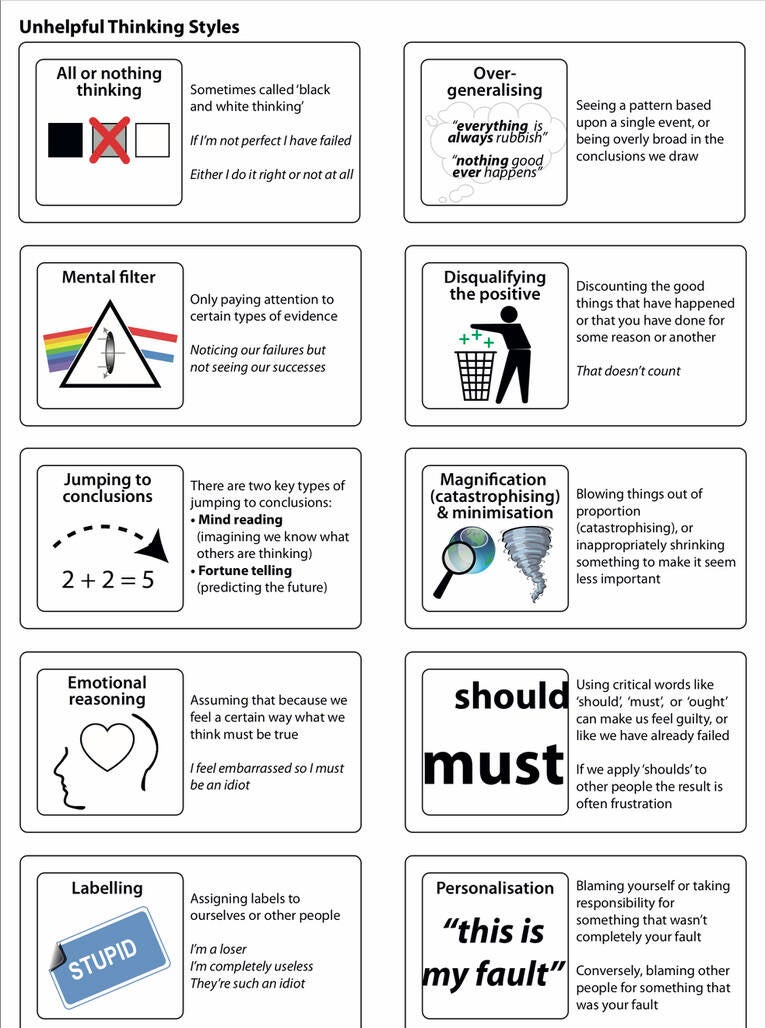by Julie-Anne Peake, Clinical Psychologist.
Introduction
This worksheet helps you understand how your thoughts influence your feelings and behaviour. It’s designed to support your therapy and everyday self-reflection. The more aware you become of your thinking patterns, the more choice you have over how you respond to challenges.
Rational Emotive Behaviour Therapy (REBT) is one of the earliest forms of Cognitive Behavioural Therapy (CBT). It teaches that our emotions come from what we believe about an event, rather than from the event itself. When we identify and change unhelpful beliefs, we can create healthier emotional responses and actions.
The ABC Model
In REBT, we use the ABC model to understand emotional reactions:
A – Activating Event: what happens.
B – Beliefs: what you tell yourself about it.
C – Consequences: how you feel and behave as a result.
When our beliefs are flexible and realistic, our emotions are balanced. When beliefs are rigid or extreme, our emotions can become intense and overwhelming.
To make change, we add two more steps:
D – Disputing: question and challenge unhelpful beliefs.
E – Effective new belief: replace them with helpful, compassionate thoughts.
Three Common Belief Patterns
REBT describes three broad patterns of irrational belief. Everyone has some of these at times, but when they become rigid “must” or “should” statements, they cause distress.
1. Approval Seeking
This belief is active when self-worth depends on others liking or approving of you.
You may think:
• I must be liked by everyone.
• If someone disapproves of me, I’m a failure.
Approval seekers often read too much into other people’s behaviour and take things personally. Learning to value yourself regardless of others’ opinions is key.
2. Achievement or Perfectionistic Beliefs
This belief is active when your worth depends on achieving, succeeding or performing perfectly.
Common thoughts include:
• I must do well or I’m useless.
• If I fail, it proves I’m not good enough.
Perfectionism can drive anxiety, guilt and exhaustion. REBT helps you aim for healthy goals without linking your worth to performance.
3. Low Frustration Tolerance (LFT)
This belief appears when you tell yourself life must be easy and comfortable.
Typical thoughts include:
• I can’t stand this.
• Things shouldn’t be this hard.
People with low frustration tolerance often avoid discomfort or get angry quickly. REBT builds tolerance by reminding you that while frustration is unpleasant, it’s survivable, and you can cope.
Unhelpful Thinking Styles
Many unhelpful thoughts are linked to these beliefs. Recognising them is the first step toward change.
• All-or-Nothing Thinking: Seeing things as entirely good or bad.
• Over-Generalising: Making sweeping conclusions from one event.
• Mental Filter: Focusing only on negatives and ignoring positives.
• Jumping to Conclusions: Assuming you know what others think (mind reading) or predicting the future (fortune telling).
• Emotional Reasoning: Believing your feelings prove something is true (I feel hopeless, so I must be).
• Should Statements: Using rigid rules like must, ought, or should.
• Labelling: Defining yourself or others by a single behaviour (I’m a failure).
• Catastrophising: Expecting the worst possible outcome.
• Personalisation: Taking excessive responsibility or blame.
• Low Frustration Tolerance: Thinking I can’t cope, It’s unbearable, or I need this right now.
Monitoring and Changing Thoughts
Our thoughts often run automatically. Writing them down helps make them visible so you can learn to become aware and evaluate them. When something triggers strong emotions, use the table in this article to explore what’s happening.
When completing your table, remember:
• Situation: Stick to the facts. What were you doing or what happened?
• Thoughts: What did you tell yourselfin the moment?
• Feelings: Name and rate their strength (0–10).
• Challenge Thoughts: Ask questions such as:
- Is this thought realistic?
- Am I using words like must, should, or always?
- What evidence supports or contradicts it?
- Will this still matter in a week, a month, or a year?
• Alternative Thought: Create a more balanced, compassionate statement. Focus on the core beliefs of approval-seeking, perfectionism or low frustration tolerance and break the dependency on needing these things to determine your self worth.
• New Feeling: Notice how the intensity of emotion changes.
Helpful Replacement Beliefs
For Approval Seekers
• I prefer others to like me, but I don’t need their approval to feel worthwhile.
• What others think of me is none of my business.
• I am a valuable person, regardless of anyone’s opinion.
For Perfectionists
• It’s okay to make mistakes; they’re part of learning.
• My worth isn’t measured by my achievements.
• I can strive for excellence without demanding perfection.
For Low Frustration Tolerance
• Life doesn’t have to go smoothly for me to cope.
• I can tolerate discomfort and still act effectively.
• I’ve handled difficulties before and will again.
The Core Message of REBT
REBT teaches unconditional self-acceptance: you are worthwhile simply because you exist. Your value isn’t determined by success, approval, or ease. Life will bring both comfort and challenge, yet you have the ability to think, adapt and grow through all of it.
References
1. Ellis, A., & Dryden, W. (2007). The Practice of Rational Emotive Behaviour Therapy (2nd ed.). Springer.
2. David, D., Lynn, S. J., & Ellis, A. (2010). Rational and Irrational Beliefs: Research, Theory, and Clinical Practice. Oxford University Press.
3. Lyons, L. C., & Woods, P. J. (2018). Meta-analysis of REBT outcomes. Psychotherapy Research, 28(3), 298–310.
4. David, D., Lynn, S. J., Ellis, A., et al. (2024). A Systematic Review of the Effectiveness of REBT. Frontiers in Psychology.
#REBT #CognitiveBehaviouralTherapy #CBT #ThoughtMonitoring #EmotionalHealth #SelfAwareness #UnhelpfulThinkingStyles #Resilience #SelfAcceptance #TraumaInformedTherapy #myMHC #JulieAnnePeake






Add comment
Comments